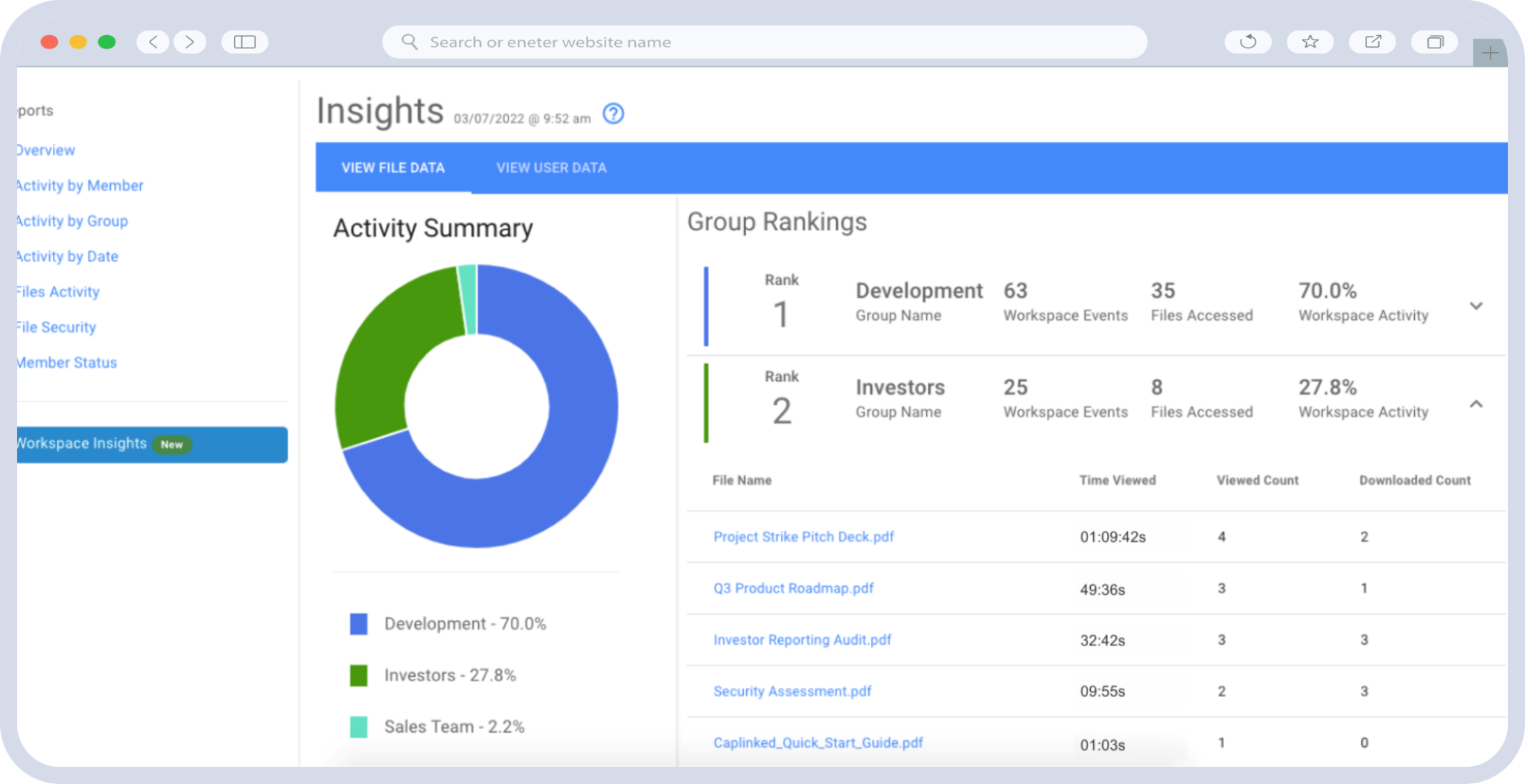Cloud hosting is an easy and convenient way to share documents, with over 60% of data now stored in the cloud. Despite this, selecting an online platform that allows businesses to view and share documents securely remains a challenge. For example, if you’re responsible for mergers and acquisitions, you need to manage hundreds of sensitive financial and legal documents and ensure the right people have the right levels of access. If a document falls into the wrong hands, it could cause severe issues — the least of which could be killing your deal.
WeTransfer has emerged as a simple solution for sharing files over the web. If you’re considering WeTransfer as a file-sharing option, you’re probably asking the question: “is WeTransfer safe?”
Here are three reasons why it might not be the best choice if you have lots of sensitive information that needs to be shared with third-party businesses and consultants.
Table of Contents
Toggle3 Reasons Why WeTransfer is Not the Secure Option
WeTransfer has not been without security issues in its history.
In 2019 it was discovered that files were sent to the wrong people, with some security experts believing the platform was hacked. In 2020, WeTransfer was blocked in India in the interest of national security, where it remains inaccessible today.
While WeTransfer works well if you need to send a handful of non-confidential files to a friend, it’s not the right option if you have to deal with hundreds of secure documents. Here are three reasons why WeTransfer is not a safe choice.
1. WeTransfer is Built for Anonymity
One of the most attractive features of WeTransfer is that you can use it without creating an account. Just drag and drop your files, say who you want to send them to, and job done.
However, the main advantage is also a significant weakness when it comes to WeTransfer safety. Files can easily end up in the wrong hands, either through user error or a security breach like the one mentioned earlier. There have also been incidents of cybercriminals using WeTransfer to send malware and phishing URLs to unsuspecting users.
The Pro version of WeTransfer provides some additional security options and features; we’ll talk more about this later. However, it’s still insufficient for the extensive document sharing and management needed for financial transactions and due diligence.
2. There is a Lack of Compliance
WeTransfer is based in Amsterdam and, as a result, complies with the EU’s strict General Data Protection Regulation, or GDPR. GDPR mandates that all companies that process the personal data of EU citizens or residents must ensure this information is stored and processed securely.
However, while WeTransfer safety is assured when it comes to GDPR, it’s not when it comes to other industry data standards. WeTransfer is not compliant with:
- Payment Card Industry (PCI) Data Security Standard
- Health Insurance Portability and Accountability Act (HIPAA)
- Federal Information Security Management Act (FISMA)
- Association of International Certified Public Accountants (AICPA) Service Organization Controls Standard
The reason WeTransfer gives for this non-compliance is that, as a European business, it’s not bound by US law.
If you’re a company owner in a regulated industry, you must use a cloud hosting provider that complies with the strictest standards. This is to protect not only your customers but also yourself.
3. There is a Focus on Form over Function
WeTransfer places a lot of focus on aesthetics. Pro customers can create their own bespoke WeTransfer pages, and there are additional tools that they can use to create pitch decks and illustrations.
The company also openly encourages businesses to advertise. Apple, Gucci, MailChimp, and Squarespace have all taken advantage of the WeTransfer homepage to promote their goods and services.
Are we saying that security and design aren’t mutually exclusive? Of course not. But people needing a solid solution for highly sensitive documents might need to rethink the idea of using a service that’s not 100% focused on secure document sharing.
Security risks are increasing, and new security protocols and standards continue to be developed by the industry. This means businesses need to rely on a provider that prioritizes the latest safety measures and not selling ad space.
Are There Any Differences in the Levels of WeTransfer Safety Between the Free and Pro Version?
WeTransfer offers both a free and paid-for version. While the paid-for version (‘Pro’) offers additional security features like the option to password-protect files and set expiration dates, it’s still not without its limitations.
The Pro version of WeTransfer lets the document owner create passwords and set expiration dates. However, while you can see who has downloaded your files in both free and pro versions, there is no mechanism to track the number of times a document has been downloaded or printed. This can be a significant security risk as that printed document can easily be photocopied, scanned, and shared by unauthorized persons.
When looking at WeTransfer safety, it’s important to note that the file-sharing service does not provide a virtual data room interface. This is an online area where secure documents can be accessed by a limited group of people, for example, during the merger and acquisition process or private equity funding. This can rule WeTransfer Pro out as a safe and secure option.
CapLinked: The Best Solution for Sensitive Documents
WeTransfer is the popular solution when it comes to sharing documents, with 80 million active users worldwide a month. However, being popular doesn’t always mean being secure.
If you’re concerned about the safety of WeTransfer, you might be wondering what the alternatives are. Here’s why CapLinked is the enterprise document security solution you can trust:
- Compliance with several global data protection regulations, including GDPR, HIPAA, PCI, FISMA, and EU-US Privacy Shield.
- Comprehensive activity tracking so you can see a complete history of every document.
- A wide range of additional security features, for example, virtual data rooms for business transactions and watermarks to show when a document was downloaded.
- FileProtect digital rights management software that lets companies share documents while keeping the ability to deny access to files; even after they’ve been downloaded.
Request Your Free CapLinked Trial Today
If you’re ready to level up your security, sign up for your free 14-day CapLinked trial today.
All paid plans come standard with 5 GB of hosting storage, file encryption, and digital rights management, making it the easy, fast, and secure alternative to WeTransfer. You’re just five minutes away from protecting your most sensitive information with CapLinked.
Sources
Business Today – WeTransfer Site Blocked over ‘National Security’; Vows to Resume Services Soon
Security Week – WeTransfer Security Incident: File Transfer Emails Sent to Wrong People
Threatpost – Popular File-Sharing Service WeTransfer Used in Malicious Spam Campaigns








